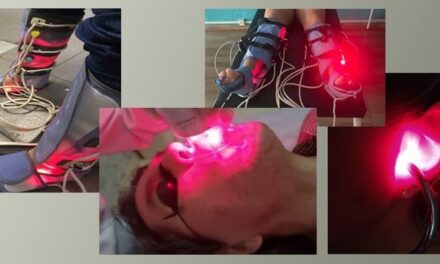
Undergraduate Ben-Gurion University of the Negev researcher Shir Kashi interacts with a robotic arm as part of her research in personalizing human-robot interactions to develop an interactive movement protocol for rehabilitation. (Photo courtesy of Ben-Gurion University of the Negev)
If an interactive robot designed to assist with patient rehab was personalized to fit each patient, it may be used more often, according to a recent study from Ben-Gurion University of the Negev (BGU) researcher Dr Shelly Levy-Tzedek.
Levy-Tzedek is head of the Cognition, Aging and Rehabilitation Lab in BGUs Department of Physical Therapy and a member of the University’s Zlotowski Center for Neuroscence, and focuses her research on the use of robots for rehabilitation of patients.
Since many patients do not practice their physical therapy routines enough or at all at home, she is designing robot companions to encourage them to practice and track their progress, notes a media release from BGU.
“In the future, human beings may increasingly rely on robotic assistance for daily tasks, and our research shows that the type of motions that the robot makes when interacting with humans makes a difference in how satisfied the person is with the interaction,” says Levy-Tzedek, in the release. “People feel that if robots don’t move like they do, it is unsettling and they will use them less frequently.”
In the study, published in Restorative Neurology and Neuroscience, Levy-Tzedek and her team observed 22 college-age participants who played a leader-follower mirror game with a robotic arm, in which a person and robot took turns following each other’s joint movements. When the robotic arm was leading, it performed movements that were either sharp, like dribbling a ball, or smooth, like tracing a circle.
The study resulted in three conclusions, per the release: robotic movement primes the human movement—that is, the person tends to imitate the movements of the robot; there was no clear-cut preference for leading or following the robot—half the group preferred to lead the human-robot movement, while half preferred to follow; and the study participants preferred smooth, familiar movements—which resemble human movements—rather than sharp (ie, robotic) or unfamiliar movements when the robot was leading the interaction.
The initial research, by undergraduate student Shir Kashi, won a “best poster award” at the Human-Robot Interaction (HRI) Conference in Vienna in March. This study was a continuation of her research. Kashi completed her undergraduate degree in cognitive sciences at BGU, and is now embarking on her graduate studies in the lab, per the release.
[Source: Ben-Gurion University of the Negev]




